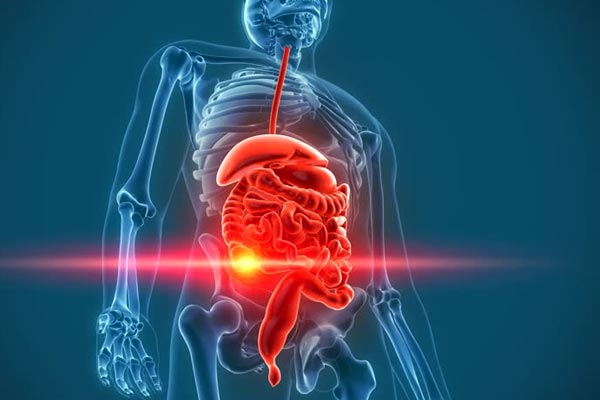Do you give your digestive system as much credit as it deserves? Every ounce of energy that your body uses comes from the tireless work of your complex gastrointestinal (GI) tract.
Being such an integral part of the human body, it’s important to understand that the digestive system is susceptible to a number of different diseases.
Even though between 60 to 70 million people are affected by a digestive system disease, it’s something that’s rarely spoken about and more often ignored.
In this guide, we’re going to explore some of the most common diseases that can plague your GI tract so you’re better educated and prepared to take curative and preventative action.
Before We Get Started…
Comprised of 10 different organs, much of the digestive system still remains a mystery to modern science today.
Of everything we know so far, here are a few fun facts to get started before we dive into the different diseases.
1- When first born, we don’t have the necessary bacteria to break down the food we eat. However, as we get older, the digestive system becomes home to more than 500 different species of bacteria.
2- Contrary to popular belief, the stomach doesn’t handle the bulk of the digestion process. Primarily responsible for mixing food with gastric juices, the stomach readies it for entry into the small intestines where the majority of digestion takes place.
3- The stomach receives roughly two liters of hydrochloric acid from the cells of the inner wall each day. The same chemical that can be found in household cleaners and used to remove rust.
4- Even though it’s only 22 feet long and an inch wide, the small intestine has a surface area of about 2,700 square feet. That’s as large as a tennis court!
5- The digestive system is prone to more cancers and causes more cancer-related deaths than any other organ system in the human body.
Understanding Digestive System Diseases
Simply put, a digestive system disease is a chronic condition that affects the normal functioning of the GI tract.
With so many moving parts, the digestive tract can become home to dozens of different diseases.
While the exact causes of some are easier to pinpoint, many can be the result of a combination of different factors such as lifestyle choices, diet, allergies, stress, bacterial infections, and genetics.
Due to the number of diverse risk factors, the best way to catch diseases early on is by closely monitoring your body for symptoms (which we are going to cover shortly).
When it comes to the GI tract, illnesses can be broken into two classes: functional GI disorders and structural GI disorders.
Functional GI Disorders
With functional disorders, the GI tract appears normal, but it doesn’t function properly.
They’re primarily caused by mobility, sensation, or gut-brain dysfunctions and are the most common problems that affect the GI tract.
Due to their unique nature, they’re rarely able to be diagnosed with traditional testing.
Structural GI Disorders
With structural disorders, the GI tract both appears and functions abnormally. These are easier to diagnose through traditional testing methods and serve as the umbrella that almost all digestive diseases fall under.
Common Digestive System Diseases, Symptoms, Diagnosis, and Treatments
Inflammatory Bowel Disease (IBD)
Unlike with inflammatory bowel syndrome, IBD causes chronic inflammation in different parts of the digestive tract that can last for weeks, months, or even years.
While the exact cause is unknown, it’s believed that genetics, gender, age, ethnicity, and smoking are the biggest contributing risk factors.
Inflammation occurs when the body’s immune system attacks the digestive tract even though no infection is present.
The prolonged immune response disrupts the normal functioning of the digestive system, can cause severe pain, and in rare cases, can be fatal.
IBD is actually broken up into two different types: Crohn’s Disease and Ulcerative Colitis.
With ulcerative colitis, only the inner lining of the large intestine (colon) is affected and there are no interruptions along the inflamed tissue.
Crohn’s Disease, can appear anywhere along the GI tract and penetrates into all of the layers rather than just the inner.
Unlike with ulcerative colitis, healthy tissue is also commonly found in inflamed areas with Crohn’s.

Symptoms
The symptoms can vary from person to person depending on how severe the inflammation is and where it’s located. Here are some of the most common shared symptoms:
- Stomach cramps/pain
- Diarrhea or constipation
- Rectal bleeding
- Fatigue
- Weight loss
- Night Sweats
- Frequent and urgent bowel movements
Crohn’s Specific Symptoms
- Mouth sores along the lower lip and bottom of the tongue
- Anal fissures and infections
- Narrowing of the anal canal
Ulcerative Colitis Specific Symptoms
- Blood and mucus in your stool
- Frequent diarrhea
- Urge to use the bathroom with no bowel movement
Diagnosing
Upon your visit, your doctor will likely ask you about the symptoms and how long you’ve been experiencing them before getting into your family history.
Stool and blood samples are usually the next step, but can’t be used alone to address IBD.
Rather, these tests will help your doctor to differentiate between Crohn’s and colitis.
To get a more clear picture, your doctor may choose to do an MRI or CT scan to examine the intestines and look for any abnormalities.
In rare cases, your doctor may opt to do a colonoscopy or capsule endoscopy so they can get a better idea of what’s going on in the large and small intestines.
Treatment
Majority of the treatments used for IBD are over the counter medications and lifestyle changes, but surgery may be recommended depending on the severity.
Anti-inflammatory Drugs
Help to reduce the inflammation and discomfort.
Immunosuppressants
Help prevent the immune system from attacking tissue along the GI tract.
Laxatives and Antidiarrheal Medications
Commonly used to help pass stool depending on your symptoms.
Antibiotics
Used to kill off any bacteria that can trigger an IBD episode.
Lifestyle Choices
Cleaning up your diet and supplementing with vitamins & minerals is a great way to ensure your body isn’t missing any of the key nutrients it needs.
Surgery
Used to remove fistulas, widen narrow areas, and remove portions of the intestines that are severely inflamed or damaged.
Diverticulitis
This disease is most common in the large intestine, but it can actually occur anywhere along the GI tract.
Diverticulitis occurs when the sacs lining your large intestine or colon become infected and inflamed.
These bulging sacs and blisters are believed to form due to increased pressure within the colon.
When the pressure in the colon is increased, fecal matter can become lodged in the diverticula (bulging sacs) and cause an infection.
Though the exact causes of diverticulitis are unknown, doctors believe that constipation and diets low in fiber are primary contributors.
One study, in particular, also found that obesity is another risk factor. Results revealed that test subjects with a higher BMI and larger waist circumference had greater chances of developing diverticulitis.
Symptoms
These are some of the most common symptoms experienced, but they will differ from person to person depending on the severity.
- Pain in the lower left side of the abdomen
- Rectal bleeding (usually following the pain)
- Nausea and vomiting
- Constipation
- Gas and bloating
- Loss of appetite
- Fever
Diagnosing
Any time that you experience severe abdominal pain or have episodes of unexpected vomiting, you should go see your doctor.
To start, they will ask about your symptoms and go over family history followed by a physical examination and stool sample.
Your doctor may also choose to complete a blood test to see if your white blood cell count is high, indicative of an infection.
If they’re still unable to give a complete diagnosis, a CT scan will help your doctor locate and identify infected diverticula.
Treatment
Depending on how severe the case is, your doctor may give you the option to treat yourself at home or in the hospital.
Home Treatment
Treatment at home can last for a few days up to several weeks. The treatment plan typically involves bed rest and a liquid only diet with prescription antibiotics. This will help to fight the infection and give your GI tract a chance to recover.
Hospital Treatment
Intravenous antibiotics are the standard treatment route, but if the infected diverticula don’t respond, surgery is a last resort. Surgery can be completed to remove the infected portion of the intestines.
Gastroesophageal Reflux Disease (GERD)
Approximately one in five people have GERD in the United States. This widespread disease goes by many other names such as acid reflux, acid indigestion, and heartburn to name a few, but they all refer to the same disease and symptoms.
GERD is a disease that affects the lower esophageal sphincter (LES), which is the small ring of muscle that connects the esophagus to the stomach.
With this disease, the LES is weakened or in a relaxed state which allows the contents of the stomach to regurgitate into the esophagus.
The severity of the damage caused by GERD depends on the content that re-enters the esophagus, with stomach acids causing the most.
Dietary and lifestyle choices are considered to be the primary contributing factors, including things like chocolate, deep-fried foods, coffee, and alcoholic beverages.
Symptoms
All of the symptoms are going to be localized to the mouth and esophagus, which, if left unchecked, can lead to complications.
- Heartburn is a burning sensation that can affect the chest, throat, and mouth
- Difficulty swallowing
- Hoarseness or a sore throat
- Acid taste in mouth
- Chronic bad breath
- Feeling of a lump in your throat
- Regurgitation of stomach contents
Diagnosis
To start, your doctor will ask about all of the symptoms you’ve been experiencing.
Once they confirm that further testing is necessary, your doctor may choose to use small devices that are able to detect acid levels in your esophagus over a predetermined amount of time.
Drinking a chalky liquid like barium may be used in conjunction with an X-Ray so that your doctor can easily see the outline of your esophagus and upper GI tract.
Lastly, a small flexible tube can also be used to perform an endoscopy and take a closer look at the tissue of the esophagus or take samples if necessary.

Treatment
Lifestyle changes in conjunction with the use of common over the counter medications are the route that most doctors prescribe, but in more severe cases, surgery may be necessary.
Lifestyle Changes
Carefully analyze your diet and eliminate foods that can cause heartburn episodes. By cleaning up your diet and breaking meals into multiple smaller servings, you can greatly reduce the symptoms of GERD. Weight loss is also highly recommended, as well as the cessation of smoking.
OTC Medications
Antacids, acid reduction, and proton pump inhibitors are all common medications that can be used to control symptoms of GERD and allow the healing of the esophagus.
Surgery
If the damage is too severe, your doctor may recommend surgery to reinforce or strengthen the LES, providing a more long-term solution.
Celiac Disease
Celiac disease is a digestive disorder caused by the body’s unnatural response to gluten.
Since the body is unable to properly break down gluten, the immune system reacts by producing a toxin that destroys the villi along the digestive tract.
When the villi are destroyed, the intestines are unable to absorb dietary nutrients which can lead to malnutrition, permanent damage, and other complications as well.
Doctors don’t know the exact cause of Celiac disease, but they believe that genetics play a large role, as well as preexisting autoimmune diseases.
Symptoms
Symptoms can vary depending on how much gluten you eat and how much intestinal damage has occurred. Children and adults can experience different symptoms.
Children Symptoms
- Irritability
- Smaller build than normal
- Delayed puberty
- Abdominal bloating
- Weight loss
- Persistent diarrhea
Adult Symptoms
- Digestive symptoms
- Iron deficiency anemia
- Joint pain or stiffness
- Fatigue
- Seizures
- Skin disorders
Diagnosis
After reviewing medical history, doctors will usually perform multiple rounds of blood tests to look at complete blood count, liver function, cholesterol levels, and alkaline phosphatase.
If they are unable to confirm a diagnosis, they may sample notable skin disorders or use an upper endoscopy to look for damaged villi and intestinal tissue.
Treatment
The only way to successfully treat Celiac disease is by completely removing gluten from your diet.
Your doctor will teach you what foods to avoid, which ones you can eat, and how to read nutrition labels so you find problematic ingredients.
With the treatment of Celiac disease, your greatest strength is going to be knowledge and research. The more you learn about the disease, the better you’ll be able to treat it.
Cirrhosis
Commonly seen in the later stages of liver disease, cirrhosis is caused by severe scarring and overall poor function of the liver.
This scarring happens when the liver is exposed to toxins or viral infections for prolonged periods of time.
According to the National Institute of Health, cirrhosis is the 12th leading cause of death in the US.
With this disease, the liver shrinks and becomes hard, hindering blood flow from the digestive tract and creating portal hypertension which can cause a number of disorders.
The most common causes of cirrhosis are uncontrolled hepatitis C infections, chronic alcohol abuse, and obesity.
Symptoms
In most cases, symptoms are not noticeable until the disease has progressed.
- Decreased appetite
- Jaundice
- Spider-shaped veins
- Abdominal swelling
- Swelling of the legs
- Weakness
- Itchy skin
- Nose bleeds
Diagnosis
Your doctor will start with a full physical exam and look for noticeable symptoms mentioned above. Once they’ve gone over your history, liver function tests, liver cancer screening, blood count, and albumin tests are usually done so they can get a better idea.
If your doctor is unable to confirm a diagnosis, they may choose to complete an MRI or CT scan. As a last resort, they can take a biopsy of the liver.
Treatment
The most important step that all cirrhosis patients must follow is the cessation of drinking alcohol.
From there, depending on the severity, your doctor can put you on beta blockers and nitrates to treat portal hypertension, as well as antibiotics to fight any infections.
If all other treatment options do not work, a liver transplant may be necessary.

Colon Cancer
The American Cancer Society suggests that 1 in 20 people will develop colon cancer over the course of their lifetime.
Starting in the large intestine, and is very difficult to detect in the early stages, making it even more important to schedule annual screenings when you hit 50.
As with most cancers, there are four stages, the first being the easiest to treat and the fourth being the most terminal.
Doctors are still unsure about what causes colon cancer, but age, genetics, obesity, smoking, drinking, and a history of inflammatory disorders have been found to increase the risk.
Symptoms
As we touched on, most symptoms of colon cancer won’t be noticeable until the later stages of the disease.
- Constipation or diarrhea
- Changes in stool color or shape
- Abdominal cramps and pain
- Blood in stool
- Excessive gas
- Unexplained weight loss
Diagnosis
Detection in the early stages gives you greatest chances of successfully being treated. Your doctor may choose to first run blood tests to rule out other diseases such as liver disorders.
Once completed, a colonoscopy is the most popular option, allowing your doctor to look for abnormalities and take samples.
Lastly, barium X-Rays and CT scans can also be used in conjunction with the above methods to further confirm the diagnosis.
Treatment
The first and most widely used treatment option is surgery to remove the infected tissue or areas of the large intestine.
Following surgery, a combination of chemotherapy and radiation therapy are typically used to kill any remaining cancerous cells.
Due to the high level of risk associated with colon cancer, the best treatment is prevention.
Anytime you experience unusual symptoms involving the lower intestinal tract, it’s best practice that you go to see your doctor as soon as possible.
Gallstone Disease
The gallbladder is responsible for storing and secreting the bile produced by the liver.
When gallstones form, they run the risk of blocking the bile from draining properly, resulting in pain, more stone formations, and a number of other complications.
Doctors believe that gallstones form when there’s a high concentration of cholesterol in the bile or too much bilirubin (comes from destroyed red blood cells).
Being overweight, having diabetes, age, and being female also contribute to the risk of developing gallstone disease.
Symptoms
Most gallstones are asymptomatic until they block the bile duct. In fact, 80% of people have gallstones with no symptoms.
- Pain in the upper right abdomen
- Nausea and vomiting
- Dark urine
- Diarrhea
- Indigestion
- Fever and chills when a blockage occurs
- Yellowing of the skin or eyes
Diagnosis
Your doctor will first check to see if you have symptoms of yellowish skin or eyes. An ultrasound is a preferred method for diagnosing gallstones, but an abdominal CT scan may also be done to further confirm the findings.
As a last resort, your doctor can choose to perform a radionuclide gallbladder scan to look for evidence of an infection or blockage.
Treatment
Most of the time, treatment for gallstone disease isn’t necessary unless they are causing you pain or other complications.
In some cases, they can even pass without notice. If you have gallstones that do require treatment, it can usually be done from home.
Taking supplements like vitamin C, iron, and lecithin are common for your doctor to suggest on top of maintaining a healthy weight with regular exercise. In extreme cases, surgery can be performed to remove the gallstones.
Knowing When It’s Time for Expert Help
At the end of the day, if you’re not a doctor and experiencing anything unusual, it’s always best to go see digestive disease consultants.
Doctors specializing in this field have extensive knowledge and relationships with other digestive disease associates so they can diagnose and treat you right the first time.
By seeking professional help at the first sign of a problem, you’re greatly reducing the risk of complications and more invasive treatment options.
If you end up putting it off or waiting, you could potentially be letting the disease worsen and cause more damage.
Prevention is the Best Medicine
As you know by now, many digestive system diseases can stem from poor lifestyle choices.
As a result, the best way to prevent them from occurring in the first place is by implementing a healthy regimen.
Here are some best practices as provided by Florida Hospital:
- Quit smoking
- Avoid excessive alcohol consumption
- Remove high-fat foods from your diet
- Limit acidic foods
- Eat a diet rich in fiber
- Exercise at least five days per week
- Avoid drugs and medications whenever possible
- Supplement with probiotics
Some Final Words
We’ve covered a lot of information in this guide that can help you identify the signs and symptoms of diseases that occur within the GI tract.
Even if you’re completely healthy now, you should always practice leading a healthy lifestyle.
Though this guide was meant to help inform you about some of the most common digestive system diseases, self-diagnosis and treatment is never a good idea. Whenever you’re in doubt, seek help from a medical professional.



3 Comments
Although unusual health conditions might develop on its own, I guess prevention and early detection are paramount for anyone to stay healthy. This piece gives an in-depth analysis of possible digestive system diseases and their diagnosis, but I’d like to know if constipation can be classified as a disease. If yes, is it a digestive system disease?
This is a very educative piece. I totally agree that prevention is the best medicine and eating and living healthy is paramount to good health, I can personally attest to that because since I quit smoking there has been a tremendous improvement in my health
thanks for sharingthis post. This is lovely and relevant